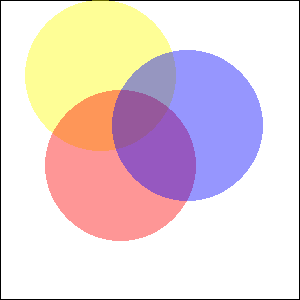imagecolorallocatealpha
(PHP 4 >= 4.3.2, PHP 5, PHP 7)
imagecolorallocatealpha — Allocate a color for an image
Beschreibung
$image
, int $red
, int $green
, int $blue
, int $alpha
)
imagecolorallocatealpha() behaves identically to
imagecolorallocate() with the addition of the transparency
parameter alpha.
Parameter-Liste
-
image -
Eine von den verschiedenen Erzeugungsfunktionen wie imagecreatetruecolor() gelieferte Grafikressource.
-
red -
Wert der Rotkomponente.
-
green -
Wert der Grünkomponente.
-
blue -
Wert der Blaukomponente.
-
alpha -
A value between 0 and 127. 0 indicates completely opaque while 127 indicates completely transparent.
red, green
and blue parameters are integers
between 0 and 255 or hexadecimals between 0x00 and 0xFF.
Rückgabewerte
A color identifier or FALSE if the allocation failed.
Diese Funktion kann sowohl das
boolsche FALSE zurückliefern, als auch einen nicht-boolschen Wert, welcher zu FALSE ausgewertet wird.
Weitere Informationen entnehmen Sie bitte dem Abschnitt über die
boolschen Typen. Benutzen Sie deshalb
den === Operator,
um den Rückgabewert dieser Funktion zu überprüfen.
Changelog
| Version | Beschreibung |
|---|---|
| 5.1.3 |
Returns FALSE if the allocation failed. Previously
-1 was returned.
|
Beispiele
Beispiel #1 Example of using imagecolorallocatealpha()
<?php
$size = 300;
$image=imagecreatetruecolor($size, $size);
// something to get a white background with black border
$back = imagecolorallocate($image, 255, 255, 255);
$border = imagecolorallocate($image, 0, 0, 0);
imagefilledrectangle($image, 0, 0, $size - 1, $size - 1, $back);
imagerectangle($image, 0, 0, $size - 1, $size - 1, $border);
$yellow_x = 100;
$yellow_y = 75;
$red_x = 120;
$red_y = 165;
$blue_x = 187;
$blue_y = 125;
$radius = 150;
// allocate colors with alpha values
$yellow = imagecolorallocatealpha($image, 255, 255, 0, 75);
$red = imagecolorallocatealpha($image, 255, 0, 0, 75);
$blue = imagecolorallocatealpha($image, 0, 0, 255, 75);
// drawing 3 overlapped circle
imagefilledellipse($image, $yellow_x, $yellow_y, $radius, $radius, $yellow);
imagefilledellipse($image, $red_x, $red_y, $radius, $radius, $red);
imagefilledellipse($image, $blue_x, $blue_y, $radius, $radius, $blue);
// don't forget to output a correct header!
header('Content-Type: image/png');
// and finally, output the result
imagepng($image);
imagedestroy($image);
?>
Das oben gezeigte Beispiel erzeugt eine ähnliche Ausgabe wie:

Siehe auch
- imagecolorallocate() - Bestimmt die Farbe einer Grafik
- imagecolordeallocate() - Löscht eine Farbdefinition